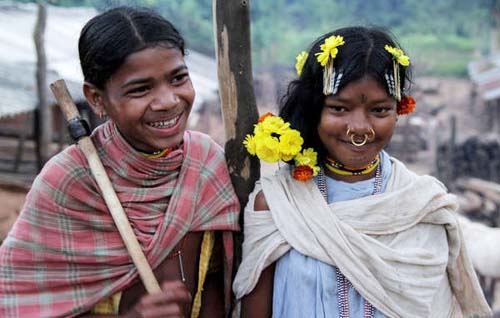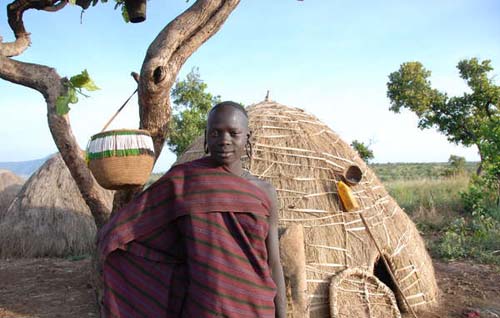- Details
- Denis Giles
- Hits: 1580

New Delhi, April 18: In a landmark ruling, the Indian Supreme Court today rejected an appeal to allow Vedanta Resources to mine the Niyamgiri hills. In a complex judgement, the court decreed that those most affected by the proposed mine should have a decisive say in whether it goes ahead.
The court recognized that the Dongria Kondh’s right to worship their sacred mountain must be ‘protected and preserved’, and that those with religious and cultural rights must be heard in the decision-making process. The tribe now has three months to decide whether to allow mining of their sacred hills, but there are serious concerns over the pressures that might be heaped on the community during this crucial time.
The Dongria’s determined fight against the FTSE 100 mining company has been likened to the story of ‘Avatar’ and has won them the support of celebrities. British actress Joanna Lumley said today, ‘It is wonderful to see justice finally prevail. For the court to allow the mine would have been unthinkable – the evidence against the mine was so strong.’
The decision deals a blow both to billionaire Anil Agarwal’s Vedanta and to the state-owned Odisha Mining Corporation, which brought the appeal and supported Vedanta’s mine from the beginning.
Final clearance for the mine was blocked by India’s Environment Minister in 2010. Until recently, however, Vedanta had kept its refinery at the bottom of the hill in operation. The refinery was closed in December 2012 due to a lack of bauxite to supply the facility.
Opposition to the mine has been vocal across the Indian state of Odisha. Thousands of protesters joined a ‘rally of defiance’ last December and hundreds of Dongria reasserted their pledge not to leave the Niyamgiri hills at their annual festival in February. The project has also come under attack from the Norwegian and British governments, the Church of England, and many others, resulting in several shareholders disinvesting from Vedanta.
At a time when the central government has been reported to want to water down tribal rights, this judgement will be seen as upholding the rights of the Dongria and all of India’s tribal peoples.
Survival International’s Director Stephen Corry said, ‘This is a huge relief, and shows that companies like Vedanta are not all-powerful: local and global campaigning really does work. Companies and governments worldwide should sit up and take notice – Vedanta has learned the hard way that the days of stealing tribal land with impunity are over. The Dongria have consistently and passionately said no to Vedanta’s mine. Let us hope that they have the final say. It is essential that they are protected from harassment and intimidation at this critical time and that, when it is made, their decision is respected by Vedanta and the government.’
- Details
- Denis Giles
- Hits: 1551
Port Blair, April 17: Despite repeated instructions published in the media, a large number of drivers of different category of vehicles are still found driving their vehicles after consuming liquor. To curb down this menace which is a major cause of road accidental deaths, the A&N Traffic Police had launched intensive checking against dangerous and drunken driving at different places of Port Blair city and its nearby areas of South Andaman Sub-Division.
During the period from 01.01.2013 to 13.04.2013, 278 two wheeler drivers, 36 Auto Rickshaw, 30 LMV drivers, 04 Bus drivers and 09 Heavy Vehicle Drivers (total 357) tested positive and were arrested U/s 184/ 185 M.V. Act 1988. Their vehicles were seized and challans were sent to the Court for further course of action. Traffic police has now provided around 20 Alcometers to the traffic personnel for conducting regular checks against dangerous and drunken driving in the jurisdiction of South Andaman Sub – Division. Several teams of traffic and local police shall be deployed exclusively for checking this menace in future also.
All vehicle drivers have been warned again not to drive vehicles after consuming liquor. The Traffic Police has taken up the cases of 189 drivers in the first phase with Licensing Authority, A&N Islands for suspension of their driving licenses. This is a part of the drive by A&N Police not only to instil road safety awareness but also as a step to ensure that you reach home safely, said the Director General of Police (i/c) in a communication to the press.
- Details
- Denis Giles
- Hits: 1400

Three independent reports have warned that the controversial Gibe III dam, and land grabs for plantations, risk imminent ‘catastrophe’ in Ethiopia’s Lower Omo Valley.
Half a million tribal people in Ethiopia and Kenya stand to be overwhelmed by these projects, whose immediate suspension Survival International has demanded.
- Lake Turkana and the Lower Omo – Hydrological Impacts of Major Dam and Irrigation Projects published by the Africa Studies Centre at Oxford University predicts the Ethiopian government’s Kuraz Sugar Project alone will cause Lake Turkana, the world’s largest desert lake, to drop by up to 22 meters. Much of the lake’s aquatic life will be destroyed, including fish stocks vital to the Turkana and other peoples living by the lake.
Bodi, Kwegu and Mursi tribespeople are now being forcibly evicted for the Kuraz project and moved into resettlement areas. Once here, they are told they must sell most of their herds and can only keep a few head of cattle. The Bodi have been told they will only get food aid when they have moved.
- Humanitarian Catastrophe and Regional Armed Conflict Brewing in the Transborder Region of Ethiopia, Kenya and South Sudan published by the Africa Resources Working Group concludes that 200,000 tribal people in Ethiopia and 300,000 in Kenya will suffer irreversible impacts from the dam and plantations.
It warns that because the dam will cause the elimination of the Omo River’s natural flood, the river’s flow will be reduced by 60-70%, and the livelihoods of the tribes who live along its banks and in its plains will be devastated. It predicts ‘major inter-ethnic conflict’.
- The Downstream Impacts of Ethiopia’s Gibe III Dam – East Africa’s Aral Sea in the Making? published by International Rivers warns that the hydrological changes from the dam and associated irrigation for the plantations, which will use fertilizers, may lead to dead zones in the Omo River.
It says that the ‘destruction of livelihoods in the Lower Omo and the coercion necessary to appropriate their lands for plantation agriculture will severely disrupt the lives of an estimated 200,000-300,000 [tribal] people’. It calls for funding for the dam to be halted.
DFID and USAID, the UK and US governments’ aid departments, are the largest single donors to Ethiopia. Both have received numerous reports of human rights abuses in the Lower Omo.
Prompted by Survival International and others, DFID sent officials to the Lower Omo to interview Mursi and Bodi villagers in January 2012. The officials were told about: arrests and beatings; the deliberate destruction of grain stores; of denied access to the Omo River; and of the widespread use of the military to intimidate people into giving up their land. There were also numerous accounts of rape.
DFID took nine months to prepare a ‘report’ of this visit, which concluded that a more detailed investigation would be required to ‘substantiate’ the allegations – since when it has done nothing.
Both DFID and USAID continue to fund Ethiopia’s ‘Protection of Basic Services’ program, without which the forced resettlement of thousands of tribal people probably could not be carried out.
Stephen Corry, Director of Survival International, said today, ‘UK money is bankrolling the destruction of some of the best-known pastoralist peoples in Africa. Taxpayers should be outraged, but they probably won’t be surprised. The UK government is renowned for only paying lip service to human rights obligations where tribal peoples are concerned. When it comes to human rights in Ethiopia, DFID’s many commitments are worthless – the department consistently ignores both its own policies and the laudable conventions it has signed up to.’